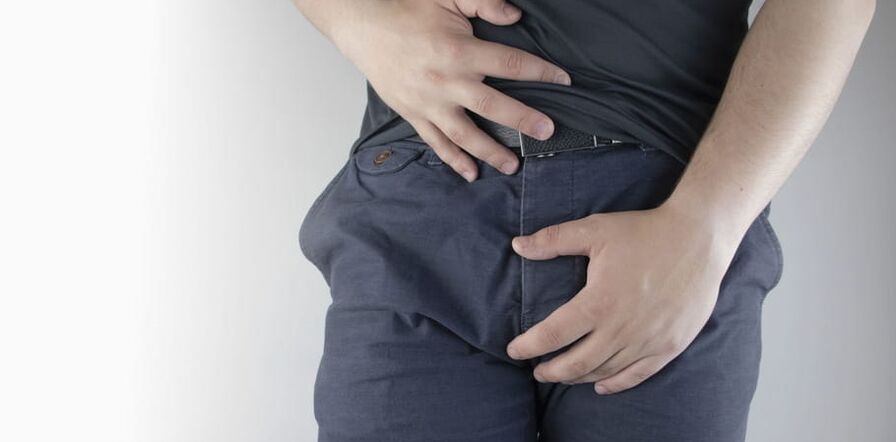For most people, varicose veins only mean pathology of the lower extremities. However, problems with blood vessels can develop in any part of the body and intimate areas in men and women are no exception. Varicose veins of the labia and other organs of the vulva, penis and testicles (varicocele) are particularly troubling.

Reasons
The main factor in the development of pathology is genetically determined weakness of the vascular wall, in which the veins lose their tone and elasticity. Additional provoking causes of varicose veins of the groin are:
- malnutrition with frequent constipation;
- chronic diseases of the genitourinary system;
- intense physical activity with tension in the pelvic muscles and anterior abdominal wall;
- slow blood circulation in the groin due to a sedentary lifestyle;
- compression of blood vessels and blockage of venous blood flow due to blood clots, scars, adhesions, tumors of various etiologies;
- changes in hormonal levels during physical maturation, pregnancy, menopause, taking hormonal drugs;
- increased load on the organs of the perineum in women before and after pregnancy, during childbirth;
- stagnation of blood and compression of the vessels of the pelvis and perineum due to the growth of the uterus;
- injuries and operations of the external genitalia in men and women;
- frequent urinary retention;
- systemic delay in ejaculation;
- frequent hot baths, baths, saunas.
Symptoms
In women, varicose veins affect the labia and other parts of the vulva, in men - the penis, scrotum. Depending on the location, the pathology has similar and different symptoms.
Common ones include:
- spider veins in the early stages;
- varicose inguinal veins protruding in the perineum, hard to the touch with altered relief, forming grape splits and nodes at 3-4 degrees of varicose veins;
- bluish skin tone;
- itching, burning, pain in the development of congestion;
- feeling of fullness;
- soreness during intimate contact, going to the toilet, exercise.
In varicose veins of the labia and vulva there are additional:
- Pain radiating to the lower back or thighs, which becomes chronic, disrupts a woman's normal life and leads to deterioration of psycho-emotional state: depression, irritability, poor sleep, neurosis.
- Hard and large vascular lumps that make it difficult to sit and move.
Varicose veins (varicocele) in men are accompanied by:
- asymmetry, prolapse, swelling of the scrotum on the side of the damaged testicle;
- discomfort, burning and pain when walking and the slightest physical exertion;
- deterioration of the quality of intimate life to impotence and infertility.
Defeat of the penis manifests itself:
- severe swelling of the veins, even at rest;
- painful erection;
- change in skin color from dark pink to dark red with a bluish tinge;
- soft tissue swelling;
- accurate hemorrhages and seals visible under the skin.
What is dangerous
Damage to the groin organs can cause serious complications and negative consequences: thickening of the blood in the vessels causes thrombosis, phlebitis, sudden bleeding provoked by sexual intercourse or tension during defecation.
Pubic lips and vulva
If left untreated, the disease progresses, causing complications:
- Varicothrombophlebitis is one of the forms of thrombophlebitis, which manifests itself in the defeat of the superficial vessels of the lower extremities. Gives complications of deep and main veins, pulmonary artery.
- Pelvic thrombosis is the formation of blood clots in the superficial and deep veins, which, if torn off, can be fatal.
As medical practice shows, the development of bleeding with such pathology is rare, and situations where rupture of an inflamed vein are rare but possible, especially during childbirth, therefore varicose veins of the labia should be treated immediately after diagnosis.
penis
Varicose veins in the penis and spermatic cord lead to reduced sperm quality and erectile function. The psychological health of the patient also suffers: the altered appearance of manhood affects the emotional state, leads to the development of depression and neurosis, to impotence.
Treatment
The basis for the treatment of varicose veins is drug treatment and elimination of factors that provoke the development of pathology - proper nutrition, exercise, drinking habits, weight correction.
Medicines are prescribed systemically in the form of tablets, capsules or topically in the form of ointments, creams. The following groups are prescribed: venotonics (phleboprotectors) to strengthen the vascular wall, increase the tone and elasticity of the veins, relieve swelling and lymphatic congestion, antiplatelet agents for resorption of blood clots, NSAIDs to reduce inflammation and pain, antipsychoticsburning and others.
Pregnant women are recommended to wear compression underwear in the form of socks or tights (with a belly pocket), for men - a special model of underwear to keep the testicles and penis in the correct position.
Of the minimally invasive methods, sclerotherapy is recommended - the introduction of special substances into the vessels that stick to the damaged areas, and the blood moves through healthy veins, as well as laser or radiofrequency ablation, which act on a similar principle - seal the affected. court.
Surgical treatment is resorted to only after the birth of a child, if the veins have not returned to health, ie the cause of varicose veins is not pregnancy.
In the early stages of the pathology it is possible to treat with alternative therapeutic methods: ointments, decoctions of medicinal plants, compresses and baths based on them. You should definitely consult your doctor before treating the pathology with alternative therapies.












































